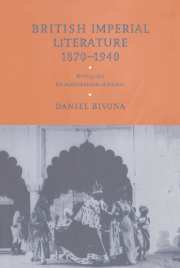Book contents
- Frontmatter
- Contents
- Acknowledgments
- Introduction
- 1 Agents and the problem of agency: the context
- 2 Why Africa needs Europe: from Livingstone to Stanley
- 3 Kipling's “Law” and the division of bureaucratic labor
- 4 Cromer, Gordon, Conrad and the problem of imperial character
- 5 T. E. Lawrence and the erotics of imperial discipline
- 6 Resurrecting individualism: the interwar novel of imperial manners
- Conclusion: work as rule
- Notes
- Bibliography
- Index
5 - T. E. Lawrence and the erotics of imperial discipline
Published online by Cambridge University Press: 02 December 2009
- Frontmatter
- Contents
- Acknowledgments
- Introduction
- 1 Agents and the problem of agency: the context
- 2 Why Africa needs Europe: from Livingstone to Stanley
- 3 Kipling's “Law” and the division of bureaucratic labor
- 4 Cromer, Gordon, Conrad and the problem of imperial character
- 5 T. E. Lawrence and the erotics of imperial discipline
- 6 Resurrecting individualism: the interwar novel of imperial manners
- Conclusion: work as rule
- Notes
- Bibliography
- Index
Summary
Consequently the relation of master and man in Arabia was at once more free and more subject than I had experienced elsewhere. Servants were afraid of the sword of justice and of the steward's whip, not because the one might put an arbitrary term to their existence, and the other print red rivers of pain about their sides, but because these were the symbols and the means to which their obedience was vowed. They had a gladness of abasement, a freedom of consent to yield to their master the last service and degree of their flesh and blood, because their spirits were equal with his and the contract voluntary.
T. E. Lawrence, Seven Pillars of WisdomWith the coming of World War I, the first general European war since early in the industrial age, one begins to glimpse the appearance, for the first time, of the recognizably modern bureaucratic military state: one featuring universal conscription and the deliberate reorientation of domestic productive capacity to the manufacture of war materiel on a vast scale. When the war was over and its cost, measured in masses of slaughtered young men, was weighed against the relatively minor adjustment of the European balance of power that the Versailles Treaty imposed, many Europeans concluded that the mechanized slaughter of modern warfare rendered obsolete all previous ways of measuring the efficacy of individual agency and the glory of battle.
- Type
- Chapter
- Information
- British Imperial Literature, 1870–1940Writing and the Administration of Empire, pp. 131 - 155Publisher: Cambridge University PressPrint publication year: 1998



